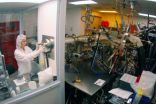(Press-News.org) A new study conducted at the University of California, San Francisco (UCSF) and Harvard Medical School predicts that the cholera epidemic in Haiti this year will be far worse than United Nations' projections, which had estimated 400,000 cases of the diarrheal disease over the course of the epidemic.
The study, to be published March 16 in the journal Lancet, is predicting instead that there could be nearly twice that number – perhaps 779,000 cases of cholera – between March and November this year alone. U.N. projections are key because they determine how resources are allocated.
"The epidemic is not likely to be short-term," said UCSF medical resident Sanjay Basu, MD, who conducted the study with Jason Andrews, MD, a former UCSF resident who is now a fellow at the Massachusetts General Hospital and Harvard Medical School. "It is going to be larger than predicted in terms of sheer numbers and will last far longer than the initial projections."
In addition to revising the predicted scope of the epidemic, Andrews and Basu modeled the effect of three public health interventions that authorities might use to curtail the epidemic: providing clean water, vaccinating some of the population and prescribing antibiotics more widely.
Expanded access to antibiotics is the most controversial of the three, said Basu, because of the high cost. However, the results of the analysis suggest that antiobiotic treatment of cholera could save thousands of lives this year in Haiti.
An Epidemic by the Numbers
Before last year's devastating earthquake in Haiti, no cases of cholera had been seen on the island for more than 100 years. But in the wake of the earthquake, the disease has reemerged as a major epidemic.
Caused by a few related strains of bacteria that spread from person-to-person through contaminated food and water, cholera causes acute diarrhea and can be deadly if untreated. Treatment is simple, for the most part, requiring health care workers to rehydrate patients with salty liquids.
Cholera is completely preventable where modern sanitation systems provide clean water for everyone. The disease thrives, however, where clean water is not available. Cholera is often found in poor and underdeveloped parts of the world, in war-torn countries, and in areas devastated by natural disasters – places where there are displaced populations, large groups of people living in overcrowded camps, and nonexistent or overtaxed sanitation and sewer systems. These are exactly the conditions that have existed in Haiti following the earthquake last year.
In the three months between October and December of last year, about 150,000 people in Haiti contracted cholera, and about 3,500 died.
In October of last year, the U.N. first projected that some 200,000 people would eventually become infected, and then two weeks later, they doubled this projection to 400,000.
According to Basu, however, the U.N. numbers did not incorporate existing disease trends or take into account major factors like where water was contaminated, how the disease is transmitted or even human immunity to cholera. Instead, they were based on a simple assumption that the disease would infect a set portion (2 to 4 percent) of Haiti's population of 10 million, Basu said.
Using data from Haiti's Ministry of Health and other sources, Andrews and Basu made a more sophisticated model of the spread of disease in several Haitian provinces. The results surprised even them, according to Basu, leading to predictions of 779,000 cases and about 11,100 fatalities in the next eight months.
Their study also examines the effect of making clean water more available and interventions involving vaccines or antibiotics. They estimate that a mere 1 percent reduction in the number of people forced to drink contaminated water would avert more than 100,000 cases of cholera this year and prevent some 1,500 deaths. Vaccinating about 10 percent of the population would spare about 900 lives. The work also predicts that extending the use of antibiotics more widely would prevent 9,000 cases of cholera and 1,300 deaths.
Antibiotics, Basu said, do not just protect "the person who receives them but also reduces their infectiousness and helps reduce transmission."
###
UCSF is a leading university dedicated to promoting health worldwide through advanced biomedical research, graduate-level education in the life sciences and health professions, and excellence in patient care.
Follow UCSF on Twitter at http://twitter.com/ucsf
UCSF study predicts cholera epidemic in Haiti will far exceed UN projections
2011-03-16
ELSE PRESS RELEASES FROM THIS DATE:
The development of better biotech enzymes
2011-03-16
Enzymes are proteins that speed up chemical reactions, such as laundry detergent digesting protein stains, which are otherwise very difficult to remove. A research team led by Professor Kam-bo Wong of the Centre for Protein Science and Crystallography, School of Life Sciences at The Chinese University of Hong Kong demonstrated a fundamental principle in changing the activity of enzymes by means of protein engineering. The findings provide potential insights into the future design of biotechnologically important enzymes, and will be published in next week's issue of the ...
Arachnophobes beware: Hubble snaps close-up of the Tarantula
2011-03-16
The wispy arms of the Tarantula Nebula were originally thought to resemble spindly spider legs, giving the nebula its unusual name. The part of the nebula visible in this image from Hubble's Advanced Camera for Surveys is criss-crossed with tendrils of dust and gas churned up by recent supernovae. These supernova remnants include NGC 2060, visible above and to the left of the centre of this image, which contains the brightest known pulsar.
The tarantula's bite goes beyond NGC 2060. Near the edge of the nebula, outside the frame, below and to the right, lie the remains ...
Risks of Breast Augmentation
2011-03-16
It is important for you to know the possible risks associated with breast augmentation before undergoing the procedure. With the placement of a foreign object into your body, breast augmentation carries an additional set of possible complications not found in other surgical procedures.
Surgical Risks
Just like any other surgical procedure, breast augmentation carries risk factors that pose an unlikely but serious threat to your health. Some serious surgical complications include:
- Allergic reaction to anesthesia - general anesthesia carries rare but potentially ...
Social class makes no difference to water contamination risk
2011-03-16
Wealthy, well educated people who choose to drink bottled water rather than water from public supplies may be no less exposed to potentially cancer-causing water contaminants, according to new research published in BioMed Central's open access journal Environmental Health.
As part of the EPICURO national bladder cancer study, researchers from all over Spain quizzed 1,270 individuals about their water use and consumption in an effort to discover whether social class has any bearing on exposure to common water disinfection byproducts. High levels of trihalomethanes (THM), ...
Teen Cell Phone Use and Car Accidents
2011-03-16
Cell phone use is on the rise. The incidence of driving and talking or texting is too. Distracted driving and youthful drivers are two factors that have always impacted accident statistics. The combination of these two factors with the advent of the cell phone has added to an increasingly dangerous trend. Many states have already enacted legislation that place additional restrictions on youthful drivers and cell phone use. There are no such laws in the state of Georgia so even with the number of teen drivers in the greater Atlanta area no restrictions exist.
The statistics ...
Prozac reorganizes brain plasticity
2011-03-16
Selective serotonin reuptake inhibitors (SSRI) such as Prozac are regularly used to treat severe anxiety and depression. They work by immediately increasing the amount of serotonin in the brain and by causing long term changes in brain function. However it can take weeks of treatment before a patient feels any effect and both beneficial effects and side effects can persist after treatment is stopped. New research published by BioMed Central's open access journal Molecular Brain investigates physiological changes within the brain that may be caused by SSRI treatment.
The ...
Miniature lasers could help launch new age of the Internet
2011-03-16
A new laser device created at the University of Central Florida could make high-speed computing faster and more reliable, opening the door to a new age of the Internet.
Professor Dennis Deppe's miniature laser diode emits more intense light than those currently used. The light emits at a single wavelength, making it ideal for use in compact disc players, laser pointers and optical mice for computers, in addition to high-speed data transmission.
Until now, the biggest challenge has been the failure rate of these tiny devices. They don't work very well when they face ...
New Rule Designed to Help Keep Occupants Inside During a Vehicle Rollover
2011-03-16
U.S. Department of Transportation has issued a new rule aimed at preventing occupant ejections in passenger vehicles.
The rule, issued by the National Highway Traffic Safety Administration (NHTSA), is designed to help reduce the number of people partially or completely ejected through side windows during rollover crashes, and will be phased in from 2013 to 2018.
New side curtain airbags will be used to contain passengers inside the vehicle, though the standards require the airbag to prevent ejection even if the widow is open.
The agency has also upgraded the roof ...
Describing humor with an equation
2011-03-16
A new theory suggests an equation for identifying the cause and level of our responses to any humorous stimuli: h = m x s
The theory argues that human beings are more reliant for their behavioural instruction on culturally inherited information than any other species, and that the accuracy of that information is therefore of unparalleled importance. Yet the individual is exposed to the continual threats of error and deception, which can seriously affect their chances of survival and success.
To compensate, humour rewards us for seeing through misinformation that has ...
Inflammation behind heart valve disease
2011-03-16
Research from Karolinska Institutet in Sweden shows, that a specific inflammatory factor may be important in the development of the heart valve disease aortic stenosis. The results suggest that anti-inflammatory medication could be a possible new treatment.
Aortic stenosis is the most common heart valve disease, which is caused by calcium deposits and a narrowing of the aortic valve. This is typically seen in the elderly, but can also be caused by a congenital defect. Aortic stenosis is currently treated by surgical replacement of the diseased valve, but research is on-going ...

